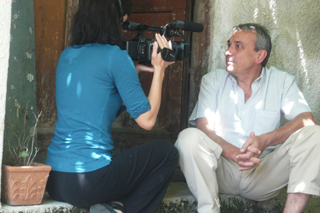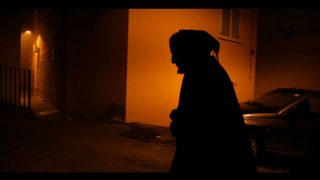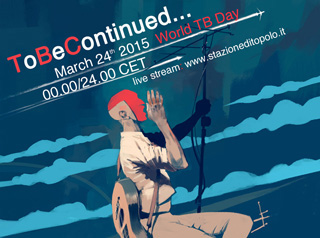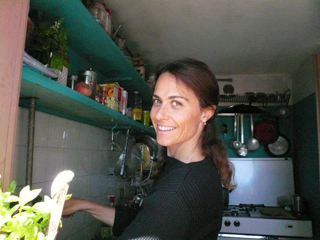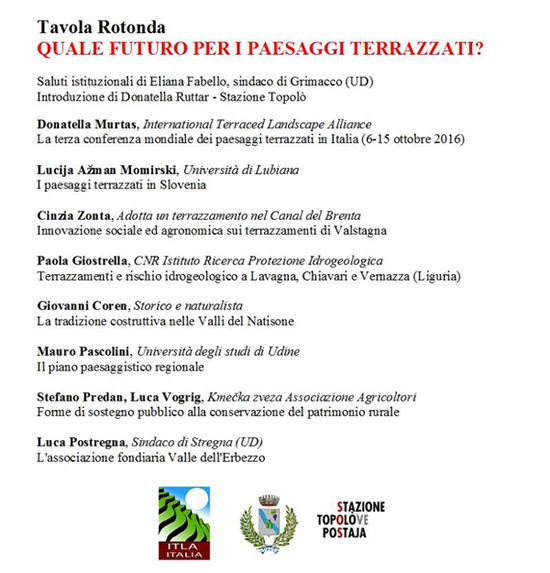Friday, July 10th |
|
| at 9am | Clodig, Blue Room of the Grimacco municipality What future for terraced landscapes? European International Landscape Alliance (ITLA) meeting |
| around 5pm | Opening eminent words for the XXII edition of Stazione |
| follows | Presentation of the project Topolò | Dordolla Art and culture to resist abandonment |
| in a barn, in loop | Go with Dry Stone Walling Short film by Juliˆ Rocha Pujol |
| until Sunday the 12th in various locations around the village |
Paesaggi abbandonati di un film | Abandoned landscapes of a film An exhibition of lost fragments of an ongoing film curated by Vlado Škafar, Vida Rucli and Marko Brdar |
| in the evening | Solo Concert of Aleksander Ipavec Ipo (accordion) with Nikla Petru?ka Panizon (voice) and Borut ?elik (effects) |
| with the dark, at the cinema | 5x10 Fifty encounter with director Alina Marazzi |
| starting today, until Sunday the 19th | ToBe Continued 2015 curated by Global Health Incubator, |
| Saturday, July 11th | |
| in the morning | Open workshop Starts the recovery of terracing with Tommaso Saggiorato |
| at 9am, in the Potok (parking lot) | Walk to discover the terraced landscape and the Kozolec, monument of rural architecture |
| in the late afternoon | Dotik encounter with American artists Maya-Rouvelle |
| in the evening | curated by Topolò Institute of Topology Emotional map of inland Italian villages with Francesco Escalona, architect |
| with the dark | Man on the moon a documentary by Giuliano Ricci in collaborazion with Kino Otok · Isola Cinema |
| during the night | Made of Water audio-video performance by Simon Longo |
| Sunday, July 12th | |
| in the afternoon | Dotik encounter with Slovenian director Vlado ?kafar |
| follows | Balkans, notes for a female history lectio magistralis by Angelo Floramo University of Topol˜ - Faculty of Balkanitude |
| in the evening | in the Jewish cemetery of Topol˜ Orchestra Abimà with Davide Casali, clarinet curated by Viktor Ullman Festival |
| with the dark | Zluodij naj vzame ujsko. Damn war! a video by the 3rd grade kids of the bilingual school of S.Pietro |
| follows | 15·18 the Great War on the Isonzo Front Tommaso Chiarandini, texts and script Cosimo Miorelli, live-painting; Massimo Croce, sounds |
| during the night | Encounter on clandestine cinema with Gianfilippo Pedote, director and producer |
Monday, July 13th |
| until Saturday the 18th | Topolovska Minimalna Orkestra Open workshop Exercises d’improvisation, by Luc Ferrari conducted by Antonio Della Marina |
| in the evening | Postaja Duo concert by Giovanni Maier (double-bass) and Paolo Pascolo (flute, sax) |
| follows | Quiet and burning sound poetry reading Antonella Bukovaz (text and voice), Massimo Croce (sounds) |
| Tuesday, July 14th | dedicated to Fonso |
| at dusk | White Cloth in concert Andrea Massaria (guitar), Luca Demicheli (bass guitar), Ermes Ghirardini (drums) |
| with the dark, in the Štiefnova house |
... dear Fonso a video composition by Leonardo Gervasi |
| follows | Grimacco, another look a Japanese television production |
| follows |
An ideal space on the frontier. site-specific project by Maya Rouvelle and Carlotta Buiatti |
| Wednesday, July 15th |
|
| until Friday the 17th | Open workshop Limit, surface, drift conducted by Enrico Malatesta |
| in the evening | Voices from the waiting room We “were” the school encounter with Paolo Patui |
| with the dark | Dancing with Maria a film by Ivan Gergolet |
| follows | Monologue a video by Michele Spanghero |
| Thursday, July 16th | |
| For the whole weekend | Listening in context audio-video installation by John Grzinich and The Drenchia Bus an audio documentary by Andrea Collavino and Renato Rinaldi curated by Topolò Institute of Topology |
| in the late afternoon | Voices from the waiting room Acque di acqua encounter with poets Nino Iacovella, Guido Cupani, Peter Semolic |
| with the dark | curated by Topolò Institute of Topology Soundtrack for The New Wild images and sounds for an ongoing film a project by Christopher Thomson |
| follows | Klanec do doma - Back home a documentary by Dušan Moravec |
| Friday, July 17th | |
| around 5pm | Dotik encounter with Norwegian artist Cecilia Jonnson |
| at sunset | The rhythm of the forest Les Tambours de Topolò in concert |
| at dusk | Navigando ad Oriente | Sailing Eastwards Panta Rei with Tiziana Bertoncini, violin |
| with the dark | Fahrtwind Aufzeichnungen einer Reisenden a documentary by Bernardette Weigel |
| deep night | Trip to Armenia testi e video-surveys for an upcoming film by Andrea Rossini; reading by Antonella Bukovaz |
| Saturday, July 18th | |
| at 9am | On the steps of Carlo Emilio Gadda Walk curated by Nediske Doline |
| during the afternoon, until late | The original arrangement was for a solo violin... a performance by Cecilia Jonsson curated by the Norwegian embassy |
| late afternoon | Farming for the landless from Kosovo to Romania, stories of bees and beekeepers encounter with English writer Sarah Waring |
| at sunset | outcomes of the open workshop Exercises d’improvisation by Luc Ferrari Topolovska Minimalna Orkestra in concert |
| with the dark | Coup de foudre avec Topolo Tiziana Bertoncini, violin Thomas Lehn, analog synthesizer |
| follows | Encounter on clandestine cinema with Slovenian director Jan Cvitkovič |
| late night | A stain on silence texts by Beckett and Cage, music by Cage Enrico Malatesta (percussions), Renato Rinaldi (voice) |
| Sunday, July 19th | |
| around 4pm | Olga Klévdarjova. A historical tale a book by Paolo Petricig presented by Piero Purini |
| follows | Koderjana IX _ a book written in Topolò Spomniti se pomeni narediti zgodbo iz preteklosti To remember is to create a story from the past by Miha Mazzini in collaboration with Kulturno Društvo Ivan Trinko |
| at sunset, in the church | Nazaj v domači raj - Return to domestic paradise concert by Utrip vocal quartet dedicated to Maria Feletig - Mlinarjova |
| with the dark | In a forest clearing close to the border Julia Kent, cello, loops, electronics, field recordings |
| late night, at the cinema | Curonia a video by John Grzinich |
|
|
Stazione di Topolò - Postaja Topolove is organized by Associazione Topolò-Topoluove under the patronage and the collaboration of Comune di Grimacco (Udine) with the financial supprt of Regione Autonoma Friuli Venezia Giulia - Assessorato alla cultura Comunità Montana del Torre, Natisone e Collio sponsored by Fondazione Crup Lilly MDR-TB Partnership, Sanofi Circolo culturale Ivan Trinko in collaborazion with Pro Loco Nediške Doline - Valli del Natisone Festival del cinema Kino Otok · Isola Cinema artistic direction Donatella Ruttar, Moreno Miorelli technical director Valerio Bergnach Voci dalla Sala d’Aspetto is curated by Michele Obit programme online at facebook.com/stazione.ditopolo | www.stazioneditopolo.it info: morenomior@gmail.com · donatellaruttar@gmail.com +39 335 5643017 | +39 338 8764776 | +39 335 1858413 |
| download the .pdf programme | |






